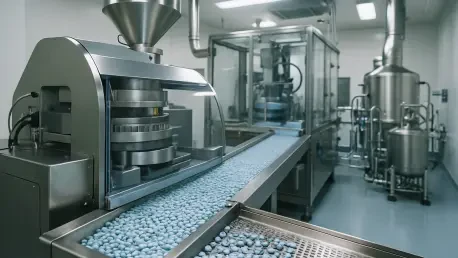In a significant move to strengthen the pharmaceutical landscape in the United States, AbbVie, a prominent player in the industry, has unveiled a substantial $195 million investment to enhance its active pharmaceutical ingredient (API) manufacturing capabilities at its North Chicago, Illinois facility. This strategic initiative comes as part of a larger commitment by the company to channel over $10 billion into U.S.-based projects, focusing on innovation and the expansion of critical production capacities. APIs, the core components that drive the therapeutic effects of medications, are at the heart of this expansion, aiming to fortify domestic production and support the creation of both current and future medicines. With key therapeutic areas like neuroscience, immunology, and oncology in focus, this investment signals a robust effort to address healthcare needs while reinforcing the nation’s manufacturing backbone. The implications of such a move extend beyond corporate growth, touching on economic vitality and national security in drug supply chains.
Expanding Domestic API Production in North Chicago
AbbVie’s latest investment targets a significant upgrade to its North Chicago facility, with construction of a new API manufacturing site set to commence in the fall of this year and expected to reach full operational status by 2027. This development is poised to enhance the company’s chemical synthesis capabilities, a critical aspect of producing high-quality pharmaceutical ingredients. Beyond technical advancements, the project will expand AbbVie’s already substantial presence in the U.S., where it employs over 6,000 individuals. The initiative reflects a deliberate strategy to localize production of essential drug components, reducing dependency on foreign sources. Robert Michael, Chairman and CEO of AbbVie, has underscored the importance of such investments in sustaining U.S. leadership in pharmaceutical innovation, emphasizing the ultimate goal of delivering transformative medicines that profoundly improve patient outcomes across various medical fields.
The impact of this expansion extends to the local and state levels, with Illinois Governor J.B. Pritzker commending the investment for its role in bolstering the state’s biomanufacturing ecosystem. This project is anticipated to create numerous job opportunities, harnessing Illinois’ world-class workforce and infrastructure to drive economic growth. The focus on domestic API production aligns with broader national interests, particularly in light of concerns over supply chain vulnerabilities. By increasing its manufacturing footprint, AbbVie not only addresses immediate production needs but also contributes to long-term stability in the pharmaceutical sector. This move is a testament to the synergy between corporate objectives and public policy goals, as it supports a stronger, more resilient healthcare framework while fostering community development through employment and economic activity in the region.
Industry Trends and Strategic Acquisitions
AbbVie’s investment is part of a wider trend among pharmaceutical giants to prioritize U.S.-based research, development, and manufacturing. This shift is driven by a collective industry recognition of risks tied to overseas API supply chains, including potential tariffs and national security concerns. Other major companies are also making significant commitments, with billions of dollars being funneled into domestic facilities over the coming years to mitigate these risks. The urgency of this pivot is further highlighted by statements from FDA Commissioner Marty Makary, who has pointed to the critical national security implications of relying on foreign API sources. To counter this, a new FDA program has been introduced to incentivize domestic manufacturing, reflecting a unified push toward self-reliance in drug production and ensuring a steady supply of essential medications.
In tandem with its manufacturing expansion, AbbVie has pursued strategic growth through a $2.1 billion acquisition of Capstan Therapeutics, a firm focused on cutting-edge CAR-T therapies that leverage a patient’s own immune cells to address diseases, notably autoimmune conditions. With Capstan’s lead drug in early-stage development, this acquisition underscores AbbVie’s commitment to diversifying its therapeutic portfolio and embracing innovative approaches to healthcare challenges. This dual strategy of enhancing manufacturing capabilities while investing in novel treatments positions the company at the forefront of pharmaceutical advancements. By balancing immediate production goals with long-term innovation, AbbVie is not only responding to current industry pressures but also paving the way for future breakthroughs that could redefine treatment paradigms in critical medical areas.
Reflecting on a Path Forward for Pharmaceutical Resilience
Looking back, AbbVie’s $195 million investment in North Chicago marked a pivotal moment in the journey toward enhanced U.S. drug manufacturing. It mirrored a broader industry shift toward domestic production, addressing vulnerabilities in global supply chains while fostering economic growth through job creation. The strategic acquisition of Capstan Therapeutics complemented these efforts, highlighting a forward-thinking approach to innovation. Moving forward, the focus should remain on sustaining such investments to build a more resilient pharmaceutical sector. Policymakers and industry leaders must continue to collaborate on initiatives that encourage local manufacturing, perhaps through expanded incentives or streamlined regulatory processes. Additionally, ongoing investment in cutting-edge therapies will be crucial to meeting evolving healthcare demands. These steps, taken together, can ensure that the U.S. remains a global leader in drug development, safeguarding both public health and national interests for years to come.









